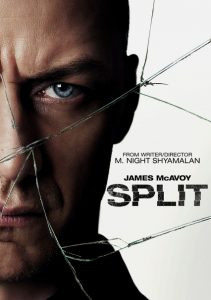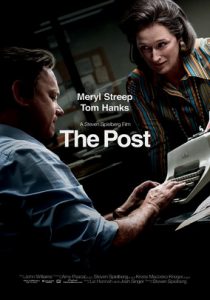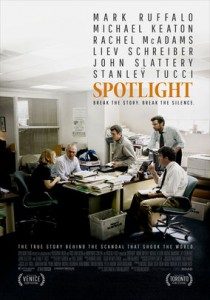Split-2016
Director M. Night Shyamalan
Starring James McAvoy, Anya Taylor Joy
Scott’s Review #821
Reviewed October 18, 2018
Grade: B-
Split (2016) is the second part of a planned trilogy; the first is Unbreakable (2000), and the third is to debut in 2019.
This point confused me because I did not notice any correlation between the films until the final scene, which was unclear.
Split has its ups and downs, mainly because of James McAvoy’s spectacular performance, which is the highlight, but the film is sadly riddled with many plot holes and nonsense.
I do not predict the film will be remembered all too well.
Casey (Joy) is a withdrawn teenage girl with an abusive past at the hands of her uncle, who raised her after her father died. She, along with two other girls, is accosted by a man (McAvoy) who chloroforms them and takes them to a hidden basement.
The girls quickly learn that their abductor is Kevin Wendell Crumb, a man suffering from Dissociative Identity Disorder (DID).
His personality ranges from that of a nine-year-old child to that of an effeminate artist, a well-dressed woman, and Kevin.
The audience (but not the girls) learns that Kevin is in therapy under the care of Doctor Karen Fletcher (Betty Buckley), an established Philadelphia psychiatrist. Fletcher is aware of Kevin’s other personalities, including an additional personality deemed “The Beast.”
She assumes this is a fantasy superhero figure.
Karen slowly pieces together the frightening depth of Kevin’s disorder and must race against time to save the girls.
McAvoy, best known for his outstanding performances in The Last King of Scotland (2006) and Atonement (2007), is also a central figure in the X-Men film franchise (2011-2019). He knocks it out of the park.
What a challenging role (or roles!) for the handsome Scottish actor. He is as convincing as the stoic and confident Kevin and provides the perfect swagger as “Patricia” and “Dennis.” Finally, he plays nine-year-old “Hedwig” with childhood innocence and insecurities.
The casting of McAvoy is a treat and a success.
How lovely to see film and television stalwart Betty Buckley back in the game with a central film role. The actress is a legend in other genres, not to mention her achievements on stage in play after play.
Eagle-eyed horror fans will undoubtedly remember Buckley’s role as the sympathetic gym teacher in Carrie (1976). In Split, she portrays another benevolent character as she is concerned for her patient’s well-being, not realizing the sinister sides he keeps hidden. The role is perfect for the warm Buckley.
Written, co-produced, and directed by the acclaimed M. Night Shyamalan, Split is no masterpiece like The Sixth Sense (1999) or even on par with The Village (2004). Instead, the result is a peculiar and uneven effort- the fascination is with McAvoy’s twenty-three different personalities, granted we only see four or five of them.
The film misses the numerous backstory scenes of Casey and her uncle hunting in the woods. These scenes slow down the action and seem overly lengthy. She was abused and can now handle herself- we get it.
This point could have been achieved within one scene.
The relationship between the three girls is okay, but the story point of Casey being an outcast and different from the other two girls seems unnecessary and thrown in.
The final scene of Bruce Willis (as Dennis Dunn from Unbreakable) is a nice nod to the previous film but is lost on anyone who has not seen it since it premiered well over a decade ago.
More of a connection between the two stories should have been featured.
In addition to McAvoy’s impressive performance, a positive is that no male characters are designed to “save the day,” which is still typical of mainstream films.
The film’s heroes are Casey (a teenage girl) and Karen (a woman in her sixties). Despite all the story pieces not aligning, attempts to make Split a more progressive-minded film must be credited.
The film’s result is fair to middling. Split (2016) is not a great effort but a decent watch. The highlights are McAvoy, a worthy role for veteran Buckley, and some good tension and moments of good peril. The story is not the high point, and Shyamalan has made better films.




